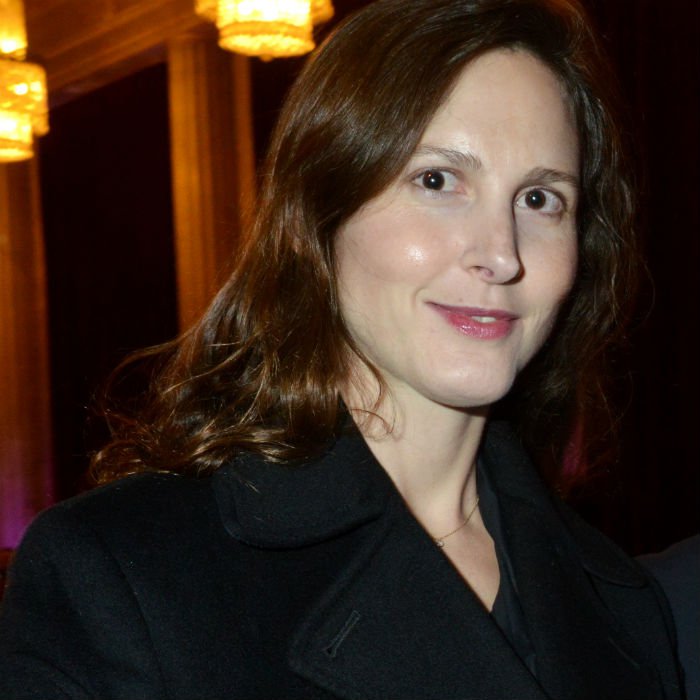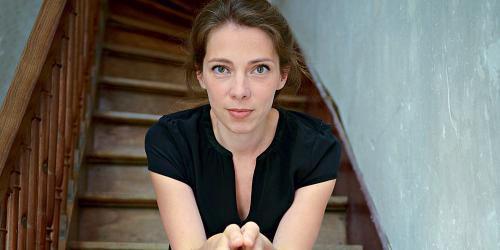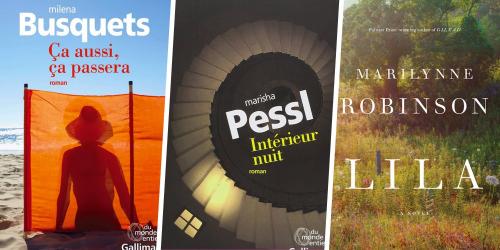A bright, gentle and funny woman
Justine does not look like her books. Bright, gentle, funny, she has gestures of squire and a small voice of cartoon. She welcomes you to her house all open doors, not people, not secret. At her house is a left bank, in Paris, a stone's throw from the Beaux-Arts, in an apartment made up of space, light, nooks and crannies. But Justine does not seem to give them any importance. It floats in the midst of things with the grace and lightness of its Venetian silhouette. There and not there.
In fact, everything goes very quickly in Justine's eyes, between the blur, the net, the attention, the laughter and, suddenly, the anxiety. She places herself in front of you, around the beautiful wooden table in her kitchen, offers you tea, and plants her eyes in yours, full of waiting and questions, beyond yours. Without ever losing the thread of the conversation, even when the frozen waiter sounds (they will have to buy a bigger freezer, to avoid shopping so often). She chains on the legacy of her mother junkie, the weight of guilt since her death, her pregnancies, her husband, the education of children ... Nicestry Nicorette on Nicorette - her "doudous" , she said smiling.
Suddenly, it is the children who come out. Return from the orthodontist, with their father. It is soon the anniversary of Suzanne, already 10 years. Deep down on the issue of gifts. Lucien insists on seeing a film. But no, it's not time. From a distance you can hear the soft purring of the bathtub filling up. Scene of a sweet, very sweet daily. Justine bet on life. She won.
"The cheerfulness is decided: by laughing we finally laugh really"
MC: "La gaieté" is the title of your new novel. A coup de théâtre in the rather depressive itinerary of Justine Levy. Why this word, precisely?
Justine Levy: (Smiles.) Because happiness, I do not believe it. And I'm not sure we can hope for it. To say happy when children die of hunger, when there is no reason to be so, in fact, I would find it a bit obscene. So cheerful, yes. We can have a pessimistic background, know that everything will end fairly badly, and say that in the meantime, we will not keep from laughing. That's what I prefer in life, laugh. I would love to write jokes books, Toto jokes, but when I sit in front of my computer, it's not what's coming. (Laughter.)
"It was when I got pregnant that I decided to stop being sad." So begins the book. It is decided, the gaiety?
Yes, it seems to me that by wanting to, it ends up walking. By laughing, we finally laugh. The liveliness of gaiety seemed to me to go with motherhood. I have memories of my mother very cheerful. Obviously, they are less truculent to write, and memory does not necessarily taste good, it is not necessarily those who come back when I think of it, but I have. And I myself have a propensity to the rather natural gaiety, inherited, for the coup, of my two parents. In fact, it is a reconquest. Even Patrick (the actor Patrick Mille, his companion and the father of his children, note), I may have chosen for it, for our common desire to laugh, even when there is nothing funny, even when it's not funny, find something funny at this big tumble. (Laughter.)
You often repeat in these pages that you are "healed" . Cured of your mother?
But I was not sick of my mother! Just her melancholy, this sadness without object that she transmitted to me. It is the most terrible, the most guilty, of being unhappy without reason. I remember seeing Mom sad and that it is terribly suffering. I would like to spare this to my children, this thing that makes you do not want to get up in the morning, that you say to yourself: "What's the point? Giving meaning to life, I think, is part of the role of parents.
When did you become a mother?
Ah la la ... It is believed that we become a mother when we are pregnant, that we decided, that it is joyous, but in reality, we did not understand at all what it is . I was a thousand miles away from imagining the tsunami, the earthquake it is. I was not at all prepared for that. Even if I had read all the books of child psychiatry. Because children are much more than all that, they take you short. (Silence, she thinks.) I think I became a mother the day my daughter called me Mom, the day I really realized that Mom was me now. Plus my mother. I did not really realize - I know, it's con - that she was not going to come back. I did not understand.
Another book on your mother, then. Perhaps the last, since it ends on a reconciliation ...
Perhaps. But I do not know if I write about my mother only to tell her what I could not tell her. My books are a kind of cenotaph, to keep it alive. I was already writing about her when she was alive, it was true she missed me so much. That's my subject, what. It was because I loved my mother infinitely, that she was an extraordinary and wonderful person, in spite of her self-destructive side, that I have been writing about her for so long. I would not do it if she had not touched me, moved me, loved her, and if I had not so deeply loved her myself.
Yes, but...
... But I am terrified when a shine of my mother passes in the face of my daughter, even if it upsets me. In fact, I spend my time watching in the rear-view mirror if I'm not giving away to my son or daughter, in spite of the roadblocks I've put in, things that come from her, it should not be duplicated. That's my obsession. There are so many families who only bounce from neurosis to neurosis ... It is the repetition that frightens me.
Is it the heredity you are tracking, the "malignant chromosomes" as you say?
I want to stop the contagion. To put an end to this melancholy that comes, in fact, long before Mom. Erase some data from the hard drive, even if I find it fascist. (Laughter.) Not exactly erase. I would like to say that it disrupts reproduction. It is strange that "to reproduce" . I want the idea of having children, it's natural. But to educate a child, to transmit things to him, it is not. My terror is that everything that is not said goes through the body and reappears in the form of symptom, when they will be teenagers. I want to break that.
You really want to be "a boring mother" ?
Ah yes ! I do not want to have a rock-and-roll life, a crazy life, not want my kids to say, "Wow, my mom is great, she's so crazy!" I want to be a reassuring mom. Boring in the sense that I am interested in exchanging basic and prosaic considerations about children. Before having children, there was no more trivial and knocking for me than mothers who exchange school stuff, health ... Now this is the only topic that really wakes me up in an evening.
"I want my children to be on the side of those who do not let themselves be screwed"
As in Louise, in your book, do you still fart the lead?
Fortunately, it is a bit of anger that goes away. From where it comes, this anger, I do not know. Do you need to know? Me, I think so, otherwise it is transmitted. I think that everything that is not understood, accepted, and finally relativized, is transmitted. What I would like to do is sort through the transmission. In an alchemist. I have a number of ingredients, Mom's rebellion and Dad's discipline, Mom's Catholicism and Dad's Judaicity, madness and rigor ... I can draw in there and tell my children: "Hold on, darling, take it, that's good." I try. It's a gamble.
You want to protect them from everything?
No. Vaccinate them against misfortune. To make sure that they will not be flayed by all that may happen to them, that they are on the side of those who do not allow themselves to be eaten, even by me. I want them to allow themselves aggressive towards me, if need be, that they do not say to themselves: "Mom is fragile." I'm probably fragile, but the mother in me is not. Being a parent requires you to be upright, not to fail. I think my mother educated me in a funny way, maybe she did not do that, but my father did that, he played both roles.
So, where did you learn the gestures? What maternal figures?
Probably on my father's side. He must be a wonderful mother. There is also my paternal grandmother, I had to steal some gestures from her. And then I think it is the children who make the parents. It was Suzanne and Lucien who aroused in me a tenderness well enclosed, that I did not authorize myself. They allowed me to unlock a door.
There are magnificent men in your life. Your father, first of all, who brought you up without ever damaging your mother's image, and who always believed in you.
Did he believe in me or did he want to reassure me, give me a little shield for life? I think a bit of both. A part of him said to himself: "She is so fragile, she collapses for nothing, I have to give her confidence in her ..." So that I do not let myself be completely done by all the storms of the world, that I am not tossed about everywhere, that I remain a little solid in the wind. It's like this all the life, a parent. Even today I call him to reassure me. Sometimes he asks me for advice, the report is a bit balanced, but I know he will always be there. Finally (smile), it is there.
And then there is this other father, the one who made you mother. Between you, it happened as quickly as you describe it?
Yes, it was her desire to be a father that made me mother too. I would not have made a child with another man. I needed a stronger desire than my fear. I think I arrived in his life at the moment when he wanted more than anything to have a child. That he chose me for it really surprised me. I said to myself: "He has to shoe other glasses on me." If I had to pass a permit, I would not have had it ... But no doubt he had perceived that I was going to invest myself thoroughly. That part of me expected only a little stability. In fact, I've changed. When we met, I was not suicidal, I was not as far as my mother, but I did not care a little about everything, especially about my health ... I am much more reasonable today.
And you are less sad.
Yes. But I changed my mind a bit on sadness. Until then, I absolutely wanted to protect my children from this vision and all that it implies from rooted misfortune. Except to go to the hotel if it fell on me. But for some time now I've decided not to hide anymore if something sad happens to me, not to deprive them of the right to sadness, the right to show it. It's not bad, either, to give them permission to be sick. With my father, it was forbidden. Diseases were always psychosomatic, it meant that we had not solved something and we had to talk about it ... My children have the right to be sick, even if they feel just how afraid we are. I understood that fragility can be a force if one knows how to use it. I'm a little less psychogenic. (Smile.)
Do you feel less guilty at last?
She's almost Jewish, my guilt. I feel guilty and try to fix it. What, I do not know yet. The day I have found it, I may have to tell the children. Maybe not giving them a grandmother, not having managed to keep my mother alive, she would have been a wonderful grandmother ... But at my age, we'll have to get out of it.


